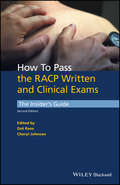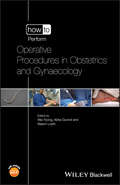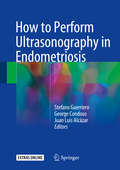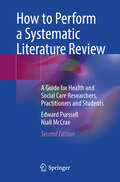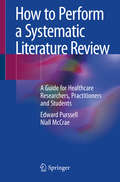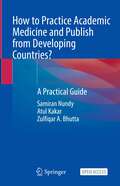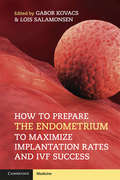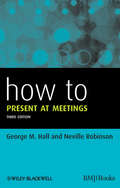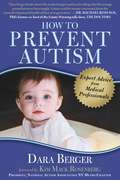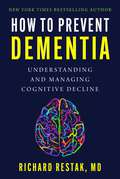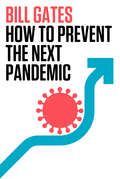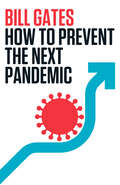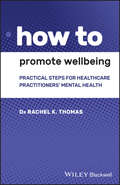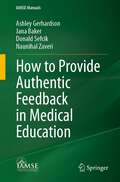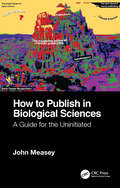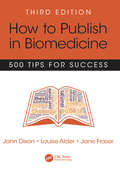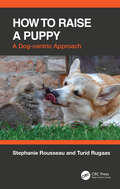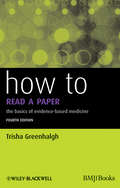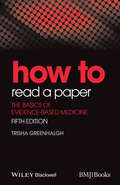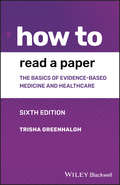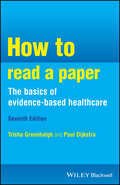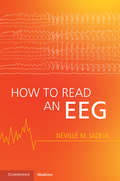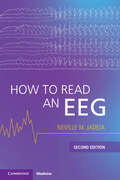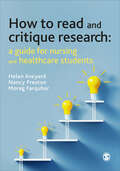- Table View
- List View
How to Pass the RACP Written and Clinical Exams: The Insider's Guide
by Cheryl Johnson Zoë RaosSurviving the journey through the Royal Australasian College of Physicians (RACP) examinations requires grit, courage and hard work. The second edition of How To Pass the RACP Written and Clinical Exams is fully updated to help candidates – and those who teach them – dig deep to maximise their chances of success. This insider’s guide takes the candidate through the whole process, from preparing for the Written Exam, through to presenting short and long cases in the Clinical Exam. The authors’ experiences are combined with tips from recent candidates, wisdom from RACP examiners and advice from specialist contributors. Additional chapters for post-exam registrars and supervisors include career planning, providing feedback, preparing for interviews, and organising the Clinical Exam. As well as comprehensive guidance for adult medicine candidates, this new edition includes ‘Paeds Points’ for paediatrics trainees. Containing a wealth of information, pearls of wisdom, real-life examples and practical advice, this light-hearted insider’s guide makes the path through the grueling RACP exams far easier.
How to Perform Operative Procedures in Obstetrics and Gynaecology (How to Perform)
by Wai Yoong Wasim Lodhi Abha GovindTrainees in Obstetrics and Gynaecology require robust operative skills, yet factors such as the implementation of structured training and increased litigation concerns have significantly limited training time. Whilst conventional textbooks are sufficient for presenting theoretical knowledge, they are inadequate in explaining practical procedures. How to Perform Operative Procedures in Obstetrics and Gynaecology thoroughly describes many key index operations in the Royal College of Obstetricians and Gynaecologists training syllabus, offering an innovative, media-rich approach to the subject. Written by a team of O&G practitioners, this unique resource combines concise written instructions, full-colour pictures and diagrams, and hours of high-quality video footage of real-life operations, narrated by experienced NHS consultants. Specialty trainees, MRCOG candidates and post-MRCOG doctors are provided clear, easy-to-follow guidance on procedures including assisted vaginal delivery, Caesarean section, abdominal hysterectomy, diagnostic and operative laparoscopy, cone biopsy, rigid cystoscopy and many others. Features a companion website containing more than six hours of video tutorials, vignettes and personal experiences Includes a colour WHO Surgical Safety Checklist Discusses non-technical aspects such as consent and understanding human factors Covers surgical instruments, surgical positioning, and sutures and needles Offers introductions, overviews, and “Top Tips” for each procedure to highlight important learning points An ideal study guide and reference for individual and group work alike, How to Perform Operative Procedures in Obstetrics and Gynaecology is indispensable for specialty trainees and those preparing for MRCOG examinations.
How to Perform Ultrasonography in Endometriosis
by Stefano Guerriero George Condous Juan Luis AlcázarThis structured dynamic book outlines, step by step, an evidence-based systematic approach to the sonographic evaluation of the pelvis in women with suspected endometriosis. This “how to” guide is intended for those with basic ultrasonography skills who want to further develop their capabilities in performing the relevant sonographic techniques to identify endometriosis. Detailed schematics, and corresponding high-resolution ultrasound images and intuitive videos support readers in expanding their technical skills and bridging the gaps in their knowledge of endometriosis ultrasound. The International Deep Endometriosis Analysis (IDEA) group consensus statement was the culmination of the work of 29 authors from 5 continents. With the publication of How to Perform Ultrasonography in Endometriosis the authors intend to provide the basis for quality improvement and benchmarking of ultrasound in the world of endometriosis. This book not only offers sonologists, radiologists and sonographers valuable insights into the field of endometriosis ultrasound, but also enables them to develop their practical skills in assessing women with chronic pelvic pain.
How to Perform a Systematic Literature Review: A Guide for Health and Social Care Researchers, Practitioners and Students
by Niall McCrae Edward PurssellThis new edition is an authoritative and accessible textbook to an activity that is often found overwhelming. The systematic review is a rigorous method of collating and synthesizing evidence from multiple studies, producing a whole greater than the sum of parts. The authors steer readers on a logical path through the process, taking account of the different needs of researchers, students and practitioners in health and social care. Practical guidance is provided on the fundamentals of systematic reviewing and also on advanced techniques such as meta-analysis. Examples are given throughout, with a succinct glossary to support the text. This new edition updates the first edition by considering a range of new and emerging issues in the systematic review process. In particular: • The need for evidence to be systematically appraised in a timely manner, particularly during public health emergencies and when urgent patient care issues are being considered. • The balance between speed and comprehensiveness. • New and developing areas of interest, such as living reviews and rapid reviews, both of which increased during Covid-19. • Advances in methodologies, and in particular meta-analysis methods • The introduction of AI and other automated processes of data management This up-to-date, accessible textbook will satisfy the needs of students, practitioners and educators in the sphere of health and social care. The authors will advise some freely available or inexpensive open source/access resources (such as PubMed, R and Zotero) to help students how to perform a systemic review and to see how this informs the guideline and decision making process.
How to Perform a Systematic Literature Review: A Guide for Healthcare Researchers, Practitioners and Students
by Niall McCrae Edward PurssellThe systematic review is a rigorous method of collating and synthesizing evidence from multiple studies, producing a whole greater than the sum of parts. This textbook is an authoritative and accessible guide to an activity that is often found overwhelming. The authors steer readers on a logical, sequential path through the process, taking account of the different needs of researchers, students and practitioners. Practical guidance is provided on the fundamentals of systematic reviewing and also on advanced techniques such as meta-analysis. Examples are given in each chapter, with a succinct glossary to support the text. This up-to-date, accessible textbook will satisfy the needs of students, practitioners and educators in the sphere of healthcare, and contribute to improving the quality of evidence-based practice. The authors will advise some freely available or inexpensive open source/access resources (such as PubMed, R and Zotero) to help students how to perform a systemic review, in particular those with limited resources.
How to Practice Academic Medicine and Publish from Developing Countries?: A Practical Guide
by Samiran Nundy Atul Kakar Zulfiqar A. BhuttaThis is an open access book. The book provides an overview of the state of research in developing countries – Africa, Latin America, and Asia (especially India) and why research and publications are important in these regions. It addresses budding but struggling academics in low and middle-income countries. It is written mainly by senior colleagues who have experienced and recognized the challenges with design, documentation, and publication of health research in the developing world. The book includes short chapters providing insight into planning research at the undergraduate or postgraduate level, issues related to research ethics, and conduct of clinical trials. It also serves as a guide towards establishing a research question and research methodology. It covers important concepts such as writing a paper, the submission process, dealing with rejection and revisions, and covers additional topics such as planning lectures and presentations. The book will be useful for graduates, postgraduates, teachers as well as physicians and practitioners all over the developing world who are interested in academic medicine and wish to do medical research.
How to Prepare the Endometrium to Maximize Implantation Rates and IVF Success
by Gabor Kovacs Lois SalamonsenThe last step in the IVF treatment cycle, embryo transfer, is also the process with the highest failure rate. No matter how good the laboratory technique is, a successful pregnancy will not be achieved without meticulous preparation of the uterus to accept the embryo. This book reviews the scientific evidence on endometrial receptivity, including histological, hormonal, biochemical, and immunological factors. Practical and concise, it supports gynecologists and embryologists to make evidence-based decisions that can influence the success rates of implantation and live births. Part of a series of books offering treatments and strategies for fertility and conception to optimize IVF outcomes, this volume is for all clinicians and embryologists working in reproductive medicine.
How to Present at Meetings (How To #33)
by Neville Robinson George M. HallDoes the thought of presenting a paper make you go cold? There are so many things to consider: getting your message across clearly, making the PowerPoint easy to read, keeping to the right length and keeping the audience riveted – enough to induce nerves even without the thought of standing up in front of a crowd and delivering your talk fluently. How to Present at Meetings, 3rd Edition, gives you practical advice on all these aspects, and more. Written by high-profile public speakers in the health sciences, it includes chapters on the 10-, 20- and 45-minute presentation, how not to make a mess of PowerPoint, and how to appear on stage.
How to Prevent Autism: Expert Advice from Medical Professionals
by Scott Smith Katie Wright James Lyons-Weiler Kim Mack Rosenberg Dara Berger Dr Sidney Baker Dr Nancy O'Hara Geri Brewster Maureen McDonnel Dr Anju Usman Dr Stephanie Seneff Maria Rickert-Hong Corinne Simpson BrownThe statistics are alarming and become more so every year. The Centers for Disease Control and Prevention estimates that 1 in 68 children have been identified with an autism spectrum disorder, making it one of the fastest growing developmental disorders in the United States. Further, the CDC estimates that parents with a child on the autism spectrum can have nearly a 20 percent chance of having a second child with autism.In How to Prevent Autism, Dara Berger shares her personal journey with autism. She describes everything that went wrong with her son that led to an autism diagnosis and everything she did differently to prevent her daughter from suffering the same fate. She interviews eight well-known ASD experts--including doctors, nutritionists, nurses, and scientists--about the factors that have led to the growing epidemic of autism. Based on the best practices for preventing autism in children, each professional offers perspectives grounded in their own research and their patients’ improvements. The book covers every detail--from the importance of mothers’ cleaning out their bodies preconception, through common genetic mutations that may put children at risk, to the crucial role of nutrition in prevention.All parents agree that every choice counts when it comes to the health of their children. As Dara Berger makes clear in this personal, informative, and authoritative book, the stakes could not be higher when it comes to autism.
How to Prevent Dementia: Understanding and Managing Cognitive Decline
by Richard RestakA comprehensive guide to preventing Alzheimer&’s and other thinking disorders from bestselling author and renowned authority Dr. Richard Restak!How to Prevent Dementia begins with the principle that the more we know about dementia, the easier it is to prevent or delay it. A better foundation of knowledge also helps people to understand and interact thoughtfully with family members and other loved ones who may have Alzheimer&’s and other dementias. Dr. Restak examines the basic thinking of normal everyday people and progresses to people with thinking disorders. In understanding that dementias exist along a continuum, starting with perfectly normal performance and ending at the extremes of mental dysfunction, we learn how our attention to everyday habits, choices, and behaviors can affect where we are located along that continuum, as well as whether or how we will progress from one part to another. As can be gleaned from recent reports, researchers may be on the cusp of a meaningful treatment or cure for Alzheimer&’s. Dr. Restak also helps the reader to grasp both the positive and challenging consequences of the new medications that will soon be available. At the end of the book, the reader will understand what practical steps can be taken each day to lessen the odds of dementia and how to take advantage of new medications, while gaining a better understanding of thinking and what it is like to have it falter.
How to Prevent the Next Pandemic
by Bill GatesThe COVID-19 pandemic isn&’t over. But even as governments around the world try to get it under control, they&’re also starting to talk about what happens next. How can we prevent another pandemic from killing millions of people and devastating the global economy?Can we even hope to accomplish this? Bill Gates believes the answer is yes, and he has written a largely upbeat book that lays out clearly and convincingly what the world should learn from COVID-19, explains the science of fighting pandemics, and suggests what all of us can do to help prevent another one.
How to Prevent the Next Pandemic
by Bill GatesFrom the author of the #1 New York Times best seller How to Avoid a Climate Disaster: The COVID-19 pandemic isn&’t over, but even as governments around the world strive to put it behind us, they&’re also starting to talk about what happens next. How can we prevent a new pandemic from killing millions of people and devastating the global economy? Can we even hope to accomplish this?Bill Gates believes the answer is yes, and in this book he lays out clearly and convincingly what the world should have learned from COVID-19 and what all of us can do to ward off another disaster like it. Relying on the shared knowledge of the world&’s foremost experts and on his own experience of combating fatal diseases through the Gates Foundation, he first helps us understand the science of infectious diseases. Then he shows us how the nations of the world, working in conjunction with one another and with the private sector, can not only ward off another COVID-like catastrophe but also eliminate all respiratory diseases, including the flu. Here is a clarion call—strong, comprehensive, and of the gravest importance—from one of our greatest and most effective thinkers and activists.
How to Promote Wellbeing: Practical Steps for Healthcare Practitioners' Mental Health (How To)
by Rachel K. ThomasHow to Promote Wellbeing is a timely resource designed to help all healthcare practitioners promote and protect their own and their patients’ wellbeing and mental health. Focusing on practical strategies and guidance, this much-needed book explores approaches for reducing burnout, managing stress, coping with pressure in healthcare settings, recognising signs of impaired decision-making, and much more. Written specifically for busy healthcare practitioners, the book offers focused and succinct chapters on topics ranging from behaviours to improve resilience and mindfulness, to approaches for maintaining work-life balance when confronted with excessive workloads and organisational pressures. Throughout the text, evidence-based tools and techniques are provided to improve the practitioner’s health and facilitate the delivery of high-quality care. Covering a wide range of clinical situations and important issues, this book: Examines global, organisational, and individual problem factors affecting mental health and wellbeing Discusses the impacts of chronic stress, burnout, technological and environmental factors, work-associated trauma, and sources of wellbeing strain Identifies factors that negatively affect patients’ wellbeing in hospital, clinic, and outpatient settings Offers guidance for emergencies and available resources for those in personal crisis Includes a mental health and wellbeing toolkit, including assessments and strategies How to Promote Wellbeing is indispensable reading for doctors, nurses, dentists, therapists, counsellors, and other clinicians and health professionals.
How to Protect Your Life Savings from Catastrophic Illness and Nursing Homes: A Handbook for Financial Survival
by Harley Gordon Jane DanielHow to avoid financial disaster from a long nursing home stay, protect your home from a Medicaid lien, choose a lawyer, protect your assets, avoid insurance traps, negotiate with a nursing home, and more
How to Provide Authentic Feedback in Medical Education (IAMSE Manuals)
by Ashley Gerhardson Jana Baker Donald Sefcik Naunihal ZaveriThis manual provides a quick reference guide to assist educators in providing authentic feedback, how to address feedback in pre-clinical and clinical situations, and the benefits of two-way feedback in improving instruction. This manual is a collective effort between medical educators designed to ensure authentic feedback is structured for both the learner and the learning environment.This manual enables medical educators to move from theory to practical application in both the preclinical and clinical settings. Through theory, the practical application of authentic feedback becomes a concrete application rather than a profound concept. Educators gain knowledge regarding how theoretical concepts become a reality leading to student success and self-directed learning. The manual guides the educator through the various modalities in which feedback is required to drive student success, such as formative practice, learning environments, small group learning, multiple-choice assessments, and clinical settings. Finally, the manual ends with two-way communication and describes the steps medical educators can take to become reflective professionals. Supported by experienced and evidence-based recommendations, medical educators, administrators, and institutions are presented with checklists, strategies, and best practices for providing authentic feedback.
How to Publish in Biological Sciences: A Guide for the Uninitiated
by John MeaseyThis book is a guide specifically for Early Career Researchers on how to publish in the Biological Sciences, whether that be your first manuscript or if you’re already experienced – there’s something for everyone.Following on from How to Write a PhD in Biological Sciences: A Guide for the Uninitiated, it will guide you through taking your manuscript to publication in peer-reviewed journals and disseminating your research more broadly. It talks you through the peer-review process, including how to respond to reviewers’ comments, the meaning and importance of Impact Factors and how to get citations. It also explores the challenges in the academic community around Open Access and other debates, including transparency, overlay journals, paywalls, publication bias, predatory journals and the dangers of bullying.Whether you are a student just completing your studies, or a supervisor struggling with rejections, this book will provide the insider information you need to get ahead.
How to Publish in Biomedicine: 500 Tips for Success, Third Edition (Radcliffe Ser.)
by Jane Fraser John Dixon Louise AlderGetting published is crucial for success in biomedicine. Whether you are a beginner or an experienced writer, you will find this book has fresh, practical tips on everyday issues. Based on the authors’ successful training courses and extensive experience of healthcare communications, this book will answer your questions and help you to avoid the most frequent problems and pitfalls. The book is designed to be very practical, and to be used when you are actually writing. It does not need to be read straight through from beginning to end before you get started. Instead, just dip into any chapter and you will find a range of tips relevant to the material you are working on right now.
How to Raise a Puppy: A Dog-centric Approach
by Turid Rugaas Stephanie RousseauHow to Raise a Puppy moves away from the traditional approach to raising puppies, focused on obedience and control, and instead takes an holistic, dog-centred approach. Drawing on research into how dogs naturally rear their young, and how dogs have evolved to behave and spend their time, it supports a new way of sharing our lives with our dogs. It also offers advice on dealing with some of the common challenges people experience with puppies, and tips for managing adolescence. A much-needed resource for dog trainers, veterinarians and behaviourists to recommend to clients, this conveys a powerful message to help overcome all too common issues so many people have with their puppies. Packed with practical advice, it offers an overdue "puppy perspective", with respect for a dog as a sentient being at its core.
How to Read a Paper
by Trisha GreenhalghThe best-selling introduction to evidence-based medicineIn a clear and engaging style, How to Read a Paper demystifies evidence-based medicine and explains how to critically appraise published research and also put the findings into practice.An ideal introduction to evidence-based medicine, How to Read a Paper explains what to look for in different types of papers and how best to evaluate the literature and then implement the findings in an evidence-based, patient-centred way. Helpful checklist summaries of the key points in each chapter provide a useful framework for applying the principles of evidence-based medicine in everyday practice.This fifth edition has been fully updated with new examples and references to reflect recent developments and current practice. It also includes two new chapters on applying evidence-based medicine with patients and on the common criticisms of evidence-based medicine and responses.How to Read a Paper is a standard text for medical and nursing schools as well as a friendly guide for everyone wanting to teach or learn the basics of evidence-based medicine.
How to Read a Paper: The Basics of Evidence-Based Medicine
by Trisha GreenhalghThe best-selling introduction to evidence-based medicineIn a clear and engaging style, How to Read a Paper demystifies evidence-based medicine and explains how to critically appraise published research and also put the findings into practice.An ideal introduction to evidence-based medicine, How to Read a Paper explains what to look for in different types of papers and how best to evaluate the literature and then implement the findings in an evidence-based, patient-centred way. Helpful checklist summaries of the key points in each chapter provide a useful framework for applying the principles of evidence-based medicine in everyday practice.This fifth edition has been fully updated with new examples and references to reflect recent developments and current practice. It also includes two new chapters on applying evidence-based medicine with patients and on the common criticisms of evidence-based medicine and responses.How to Read a Paper is a standard text for medical and nursing schools as well as a friendly guide for everyone wanting to teach or learn the basics of evidence-based medicine.
How to Read a Paper: The Basics of Evidence-based Medicine and Healthcare (How To #22)
by Trisha GreenhalghRequired reading in many medical and healthcare institutions, How to Read a Paper is a clear and wide-ranging introduction to evidence-based medicine and healthcare, helping readers to understand its central principles, critically evaluate published data, and implement the results in practical settings. Author Trisha Greenhalgh guides readers through each fundamental step of inquiry, from searching the literature to assessing methodological quality and appraising statistics. How to Read a Paper addresses the common criticisms of evidence-based healthcare, dispelling many of its myths and misconceptions, while providing a pragmatic framework for testing the validity of healthcare literature. Now in its sixth edition, this informative text includes new and expanded discussions of study bias, political interference in published reports, medical statistics, big data and more. Offers user-friendly guidance on evidence-based healthcare that is applicable to both experienced and novice readers Authored by an internationally recognised practitioner and researcher in evidence-based healthcare and primary care Includes updated references, additional figures, improved checklists and more How to Read a Paper is an ideal resource for healthcare students, practitioners and anyone seeking an accessible introduction to evidence-based healthcare.
How to Read a Paper: the Basics of Evidence-Based Healthcare (How To)
by Trisha M. Greenhalgh Paul DijkstraLearn to assess published research in this best-selling introduction to evidence-based healthcare Evidence-based practices have revolutionized medical care. Clinical and scientific papers have something to offer practitioners at every level of the profession, from students to established clinicians in medicine, nursing and allied professions. Novices are often intimidated by the idea of reading and appraising the research literature. How to Read a Paper demystifies this process with a thorough, engaging introduction to how clinical research papers are constructed and how to evaluate them. Now fully updated to incorporate new areas of research, readers of the seventh edition of How to Read a Paper will also find: A careful balance between the principles of evidence-based healthcare and clinical practice New chapters covering consensus methods, mechanistic evidence, big data and artificial intelligence Detailed coverage of subjects like assessing methodological quality, systemic reviews and meta-analyses, qualitative research, and more. How to Read a Paper is ideal for all healthcare students and professionals seeking an accessible introduction to evidence-based healthcare – particularly those sitting undergraduate and postgraduate exams and preparing for interviews.
How to Read an EEG
by Neville M. JadejaThe EEG is a simple and widely available neurophysiological test that, if interpreted correctly, can provide valuable insight into the functioning of the brain. However, despite its increasing usage in a range of settings, there is a common misconception that the EEG is inherently difficult to interpret. Compounding the problem is the lack of dedicated training and no standardized approach by encephalographers. This book provides a clear and concise guide to reading and interpreting EEGs in a systematic way. Presented in three sections, the first delivers foundational technical knowledge of how EEGs work, and the second concentrates on a comprehensive, stepwise approach to reading and interpreting an EEG. The third section contains examples of EEGs in common scenarios, such as seizures and post-cardiac arrest, enabling readers to correlate their findings to clinical indications. Heavily illustrated with over 200 example EEGs, this is an essential pocket guide to interpreting these tests.
How to Read an EEG
by Neville M. JadejaThe EEG is a widely available neurophysiological test that, if interpreted correctly, provides valuable insight into brain function. Thoroughly revised for its second edition, this book demystifies their interpretation using a systematic approach that will benefit those looking to learn the art and science of EEG interpretation. Presented in three sections, the first delivers the foundational technical knowledge of how EEGs work, the second concentrates on a stepwise approach to analysing waveforms. The third section contains examples of EEGs in common scenarios, enabling readers to correlate their findings with clinical indications. Report writing is covered in depth in the appendix. Heavily illustrated with over 200 actual EEG examples, this is an essential handbook for all those seeking to learn and practice EEG reading. Perfect for residents, fellows, medical students on neurology/EEG electives, neurodiagnostic technologists, and experienced neurologists interested in an EEG refresher.
How to Read and Critique Research: A Guide for Nursing and Healthcare Students
by Helen Aveyard Nancy Preston Morag FarquharDo you find research challenging to read? Do you struggle to get to grips with a research paper? Understanding, critiquing and using research is a key requirement of students studying nursing and healthcare. This bookwill equip you with the skills you need to understand research and use it in your practice and academic assignments. The approach used in this book is unique: each chapter focuses on a published research paper – one you might be asked to read for a seminar or include in your academic work. In clear, straightforward language, the authors take you through each paper step by step, using it as a basis for exploring the underpinning research method or design, and how it has been reported. Key features: · Each chapter focuses on a different research method by working through a relevant research paper · Identifies the main skills you need for your course: understanding research methods and critiquing articles · Written specifically for nursing and healthcare students by experienced nursing and health care lecturers · Develops your confidence in understanding research by helping you to apply your knowledge to real research papers.
